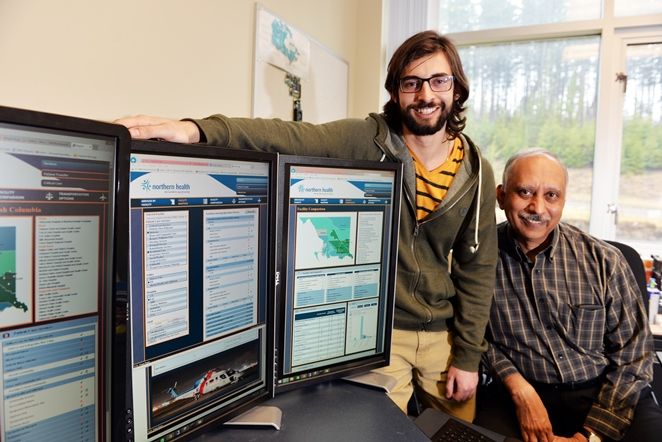UNBC collaborative research project to enhance patient transfer across BC
JOINT RELEASE with Northern Health
Prince George, BC – Some of the decisions related to transferring patients to the most appropriate health-care facility in British Columbia just became more streamlined, thanks, in part, to a research project led by the University of Northern British Columbia.
In collaboration with Northern Health, Dr. Waqar Haque a computer science and business professor at UNBC, and students from UNBC’s Computer Science and Business programs have created software that turns health services data previously collected on spreadsheets into a user-friendly system that eases inter-facility transfers. With the ability to quickly understand the clinical services available across multiple facilities, health-care staff can identify potential facilities that best meet a patient’s needs in just a few mouse clicks. In collaboration with the BC Patient Transfer Network, health care providers can ensure patients receive timely and appropriate transfers.

UNBC Computer Science and Business professor Dr. Waqar Haque (at right) with Devin Calado, a fourth-year computer science student. Download high-resolution image
Download high-resolution image
“It is fantastic that this project was developed right here in the North and it will make a real difference to many patients and their families,” said Prince George-Valemount MLA Shirley Bond. “The software helps streamline the information needed for patient transfers to ensure that the patient is in a facility that best meets their health care needs.”
“This project is a great example of the innovative work being conducted not only here in the North, but across the province to develop solutions that help improve the patient experience,” said Prince George-Mackenzie MLA Mike Morris. “This software simplifies, what can be a complex process, making it easier for patients and for staff.”
The new software system offers facility profiles and information, enabling health-care sites to be assessed on multiple services a patient may require, such as specialists on site, diagnostic equipment available, and patient-care services. In addition, facilities can easily update service changes using a simple web form, which then automatically uploads to the entire system.
“In class, we discuss experiential learning all the time. For this project, our students had an opportunity to directly apply business intelligence techniques to the issue of patient transfer,” said Dr. Haque. “We incorporated key facility performance indicators to create a system that provides quick and interactive navigation for health-care staff.”
Data from health services in more than 26 facilities in Northern BC was integrated into the system created for Northern Health.
“This has been a great partnership with UNBC that will profoundly impact care for out-of-town patients,” said Beth Ann Derksen, Northern Health’s Executive Lead of Critical Care. “Transfers between health facilities have usually meant a lot of time spent on phone calls and looking up various information. What can sometimes take up to four hours to do, involving various staff, will be reduced to about 10 minutes.”
"This is a terrific example of how people from Northern BC and across the province can benefit from the world-class research conducted at UNBC," says UNBC President Dr. Daniel Weeks. "By partnering with agencies such as Northern Health, UNBC can continue to be a leader in finding solutions to challenges facing our region, our province, and our country."
An abstract on the research paper for the software project, titled “Using Business Intelligence for Efficient Inter-Facility Patient Transfer”, is available at http://www.ncbi.nlm.nih.gov/pubmed/25676968
-30-